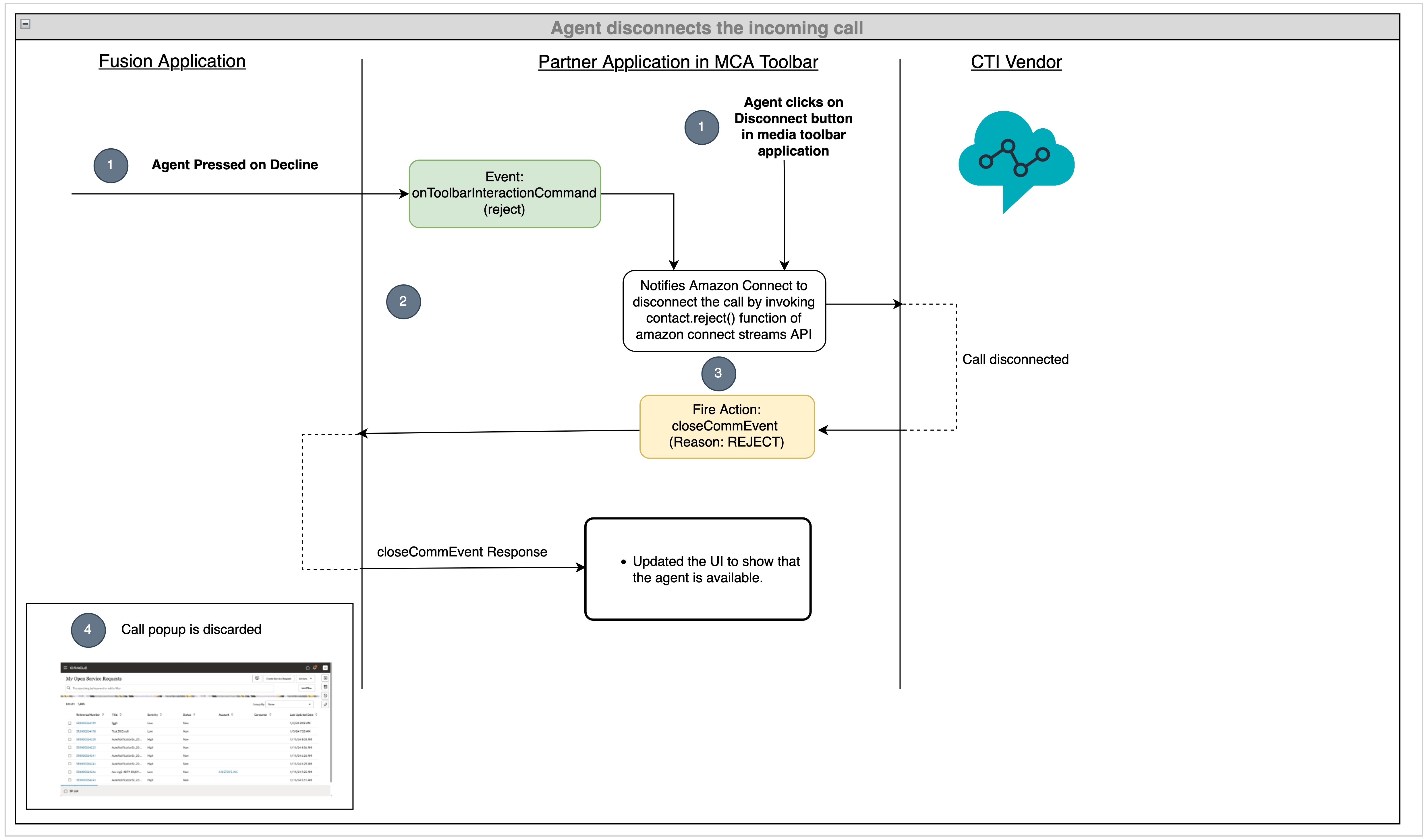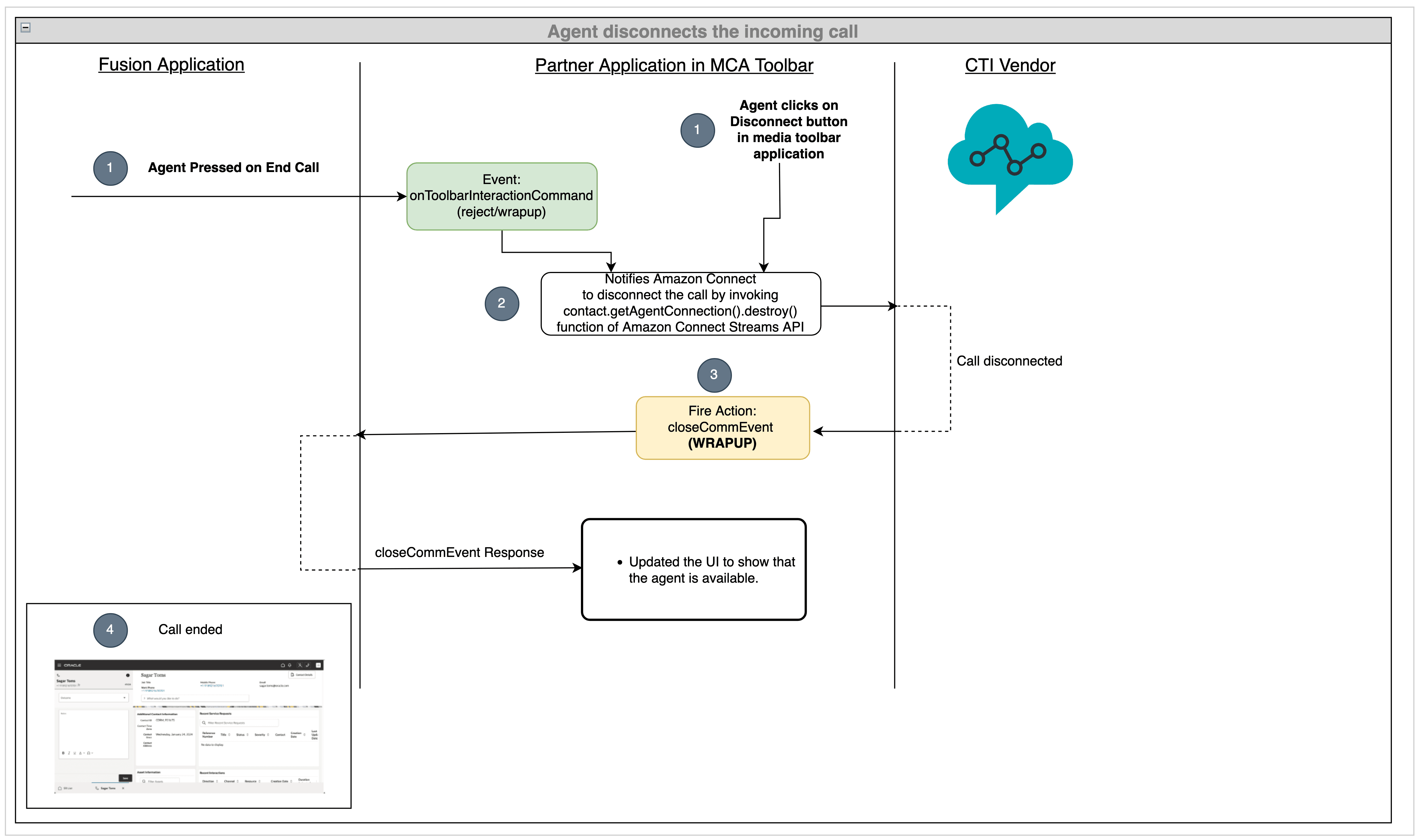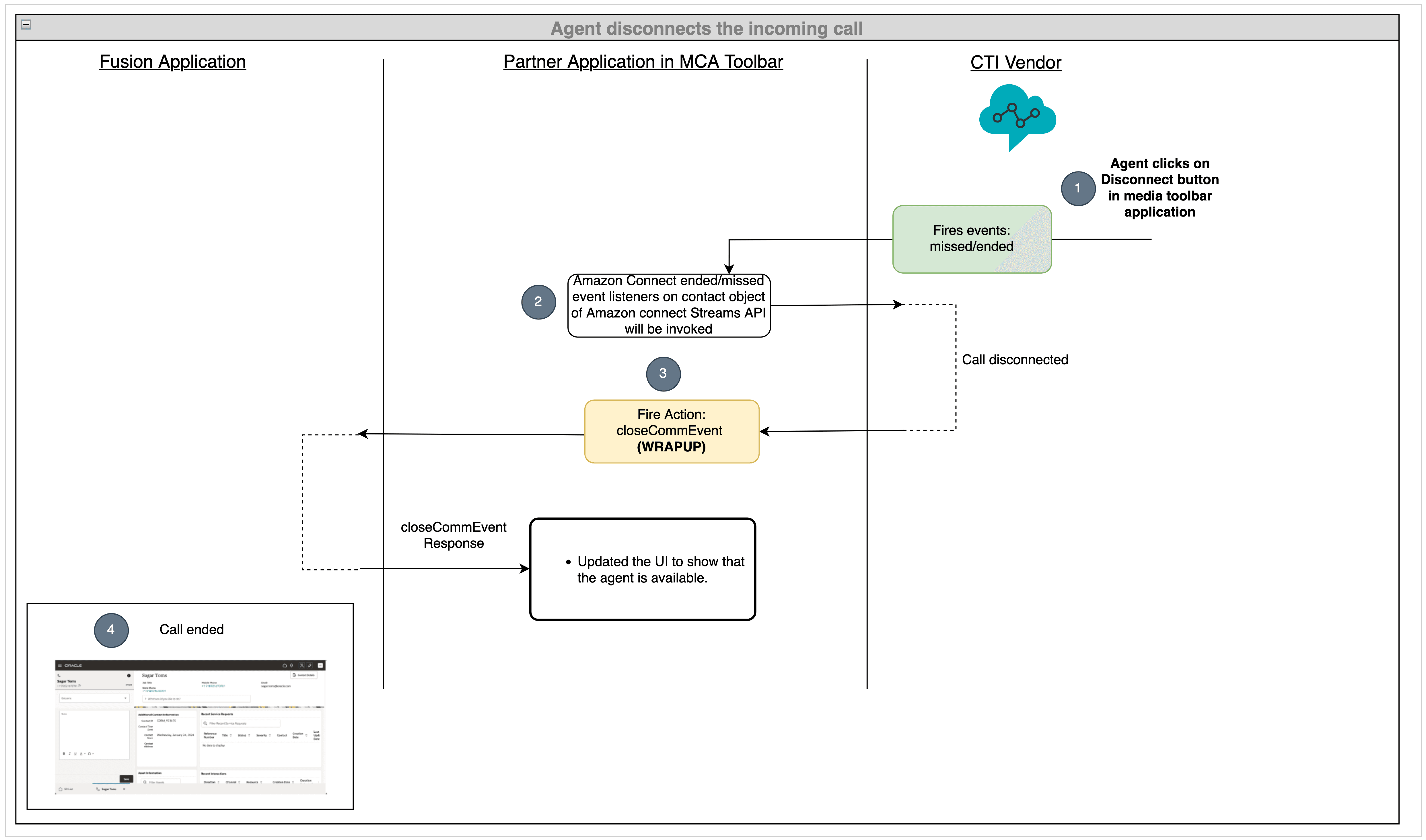Disconnect or reject an incoming call in Amazon
All the call related operation such as call accept, reject, disconnect, mute and so
on are performed on the Contact object of the Connect
Streams API.
You can use the contact.reject() function to reject a call and the
contact.getAgentConnection().destroy() function to disconnect the
call.
Calls can be disconnected in one of three ways:
- Agent rejects the incoming call before the call is accepted.
- Agent disconnects the call after the conversation is complete.
- Customer disconnects the call.
Scenario 1: Agent rejects the incoming call before the call is accepted
The following flow diagram shows the sequence of operations performed once an agent rejects the call in the Fusion application or from the media toolbar application:

- The agent can reject the call either from the Fusion application or from
your media toolbar application. When the agent clicks the Decline button in
the Fusion application, the
onToolbarInteractionCommandevent is fired with command asreject. - The partner application receives this event and if the event is to reject
the call, the
Amazon Connect StreamsAPI can be called to reject the call. - After the CTI supplier notifies the partner application that the call has
been rejected, the partner application can fire the
closeCommEventaction with reason asREJECT. - Once the Fusion application identifies this action, the call dialog box is discarded from the UI.
Update the rejectCallexample:
public async rejectCall(): Promise<void> {
this.contact.reject({
success: () => {
console.log("Rejected call")
},
failure: (err: any) => {
console.error("Reject error", err);
}
});
}Scenario 2: Agent disconnects the call once the conversation is complete
The following flow diagram shows the sequence of operations performed once an agent disconnects the call from the Fusion application or from the media toolbar application:

- The agent can reject the call either from the Fusion application or from
your media toolbar application. When the agent clicks the Decline button in
the Fusion application, the
onToolbarInteractionCommandevent is fired with command asreject. - The partner application receives this event and if the event is to
disconnectthe call, theAmazon Connect StreamsAPI to disconnect the call can be called. - After the CTI supplier notifies the partner application that the call is
rejected, the partner application can fire the
closeCommEventaction with reason asHANGUP. - After the Fusion application identifies the action, it displays the Wrap Up window.
Update the hangupCall example:
public async hangupCall(): Promise<void> {
this.contact.getAgentConnection().destroy({
success: function () {
console.log("Contact complete disconnected");
this.contact.clear({
success: function () {
console.log("Contact call clearContact");
},
failure: function (err: any) {
console.log("Contact call clearContact failure", err);
},
});
},
failure: function (err: any) {
console.log("Contact call complete failure", err);
},
});
}Scenario 3: Customer disconnects the call
The following flow diagram shows the sequence of operations performed when the customer disconnects the call:

- When a customer disconnects a call, Amazon Connect fires the
disconnectedevent. - You add an event listener in your media toolbar application for the
rejectanddisconnectevents. - The
closeCommEventaction is fired from your media toolbar application with reason asREJECTorWRAPUP. - After the Fusion application identifies the action, it displays the Wrap Up window.
Complete code
import { ICtiVendorHandler } from './ICtiVendorHandler';
import "amazon-connect-streams";
import { IntegrationEventsHandler } from '../integrationEventsHandler';
export class VendorHandler implements ICtiVendorHandler {
private connect: any;
private agent: any;
private contact: any;
private integrationEventsHandler: IntegrationEventsHandler;
private eventId: string = '';
constructor(integrationEventsHandler: IntegrationEventsHandler) {
this.integrationEventsHandler = integrationEventsHandler;
this.connect = (window as any)["connect"];
}
public async makeAgentAvailable(): Promise<void> {
if (!this.agent) {
this.init();
this.subscribeForAmazonEvents();
this.subscribeContactEvents();
} else {
let state = this.agent.getAgentStates()[0];
this.agent.setState(state);
}
}
public async makeAgentUnavailable(): Promise<void> {
let state = this.agent.getAgentStates()[1];
this.agent.setState(state);
}
public async makeOutboundCall(phoneNumber: string, eventId: string): Promise<void> {
}
public async acceptCall(): Promise<void> {
this.contact.accept();
}
public async rejectCall(): Promise<void> {
this.contact.reject({
success: () => {
console.log("Rejected call")
},
failure: (err: any) => {
console.error("Reject error", err);
}
});
}
public async hangupCall(): Promise<void> {
this.contact.getAgentConnection().destroy({
success: function () {
console.log("Contact complete disconnected");
/*
this.contact.clear({
success: function () {
console.log("Contact call clearContact");
},
failure: function (err: any) {
console.log("Contact call clearContact failure", err);
},
});
*/
},
failure: function (err: any) {
console.log("Contact call complete failure", err);
},
});
}
// Intialize Amazon connect ccp
private init() {
const containerDiv = document.getElementById("amazon-connect-cca-container");
this.connect.core.initCCP(containerDiv, {
ccpUrl: 'https://cti-amazon-connect-demo.my.connect.aws/ccp-v2', // REQUIRED
loginPopup: true, // optional, defaults to `true`
loginPopupAutoClose: true, // optional, defaults to `false`
loginOptions: {
// optional, if provided opens login in new window
autoClose: true, // optional, defaults to `false`
height: 600, // optional, defaults to 578
width: 400, // optional, defaults to 433
top: 0, // optional, defaults to 0
left: 0, // optional, defaults to 0
},
region: "eu-west-2", // REQUIRED for `CHAT`, optional otherwise
softphone: {
// optional, defaults below apply if not provided
allowFramedSoftphone: true, // optional, defaults to false
disableRingtone: false, // optional, defaults to false
},
pageOptions: {
//optional
enableAudioDeviceSettings: false, //optional, defaults to 'false'
enableVideoDeviceSettings: false, //optional, defaults to 'false'
enablePhoneTypeSettings: true, //optional, defaults to 'true'
},
ccpAckTimeout: 5000, //optional, defaults to 3000 (ms)
ccpSynTimeout: 3000, //optional, defaults to 1000 (ms)
ccpLoadTimeout: 10000, //optional, defaults to 5000 (ms)
});
}
private subscribeForAmazonEvents() {
this.connect.agent((agent: any) => {
this.agent = agent;
let state = this.agent.getAgentStates()[0];
this.agent.setState(state);
});
}
private subscribeContactEvents() {
this.connect.contact((contact: any) => {
this.contact = contact;
this.eventId = contact.contactId;
contact.onConnecting((contact: any) => {
console.log("Contact onConnecting >", contact);
const phoneNumber = contact.getActiveInitialConnection().getEndpoint().phoneNumber;
this.integrationEventsHandler.incomingCallHandler(phoneNumber, this.eventId);
});
contact.onAccepted((contact: any) => {
console.log("Contact onAccepted >", contact);
this.integrationEventsHandler.outboundCallAcceptedHandler(this.eventId);
});
contact.onEnded(async (contact: any) => {
console.log("Contact onEnded >", contact);
this.integrationEventsHandler.callHangupHandler(this.eventId);
});
contact.onMissed((contact: any) => {
console.log("Contact onMissed >", contact);
this.integrationEventsHandler.callRejectedHandler(this.eventId);
});
});
}
}Verify your progress
- Make an inbound call and see the incoming call notification in both the Fusion application and the toolbar window. Reject the call and the call notification will close.
- Make an inbound call and see the incoming call notification on both the
Fusion application and the toolbar window. Accept the call and then end the
call from Fusion application and the engagement will be changed to the
wrapupstate. - Make an inbound call and see the incoming call notification on both the
Fusion application and the toolbar window. Accept a call and then end the
call from user side and the engagement will be changed to the
wrapupstate.